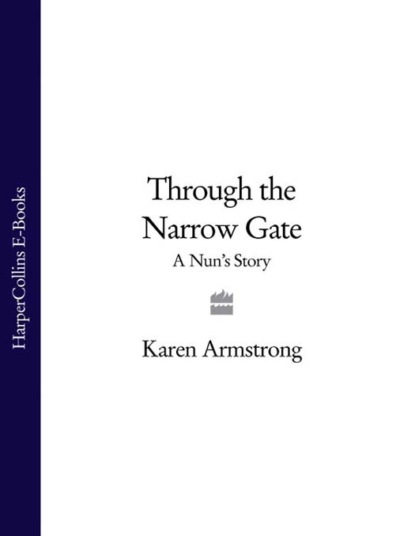По всем вопросам обращайтесь на: info@litportal.ru
(©) 2003-2024.
✖
Through the Narrow Gate: A Nun’s Story
Настройки чтения
Размер шрифта
Высота строк
Поля
I am not claiming any great visionary experience, yet occasionally while studying theology, I too feel uplifted by a second of wonder and delight that momentarily illuminates the whole page. This type of spirituality would, it seems, have suited me better than the kind of meditation we learned in the convent. Everybody comes to the divine in his or her own way, and it seems that my writing and broadcasting career, which has often been critical of certain aspects of religion, has led me back to some form of religious life.
I could not have known this when I sat down to write Through the Narrow Gate in 1980. I am no longer a practicing Roman Catholic, but I usually call myself, slightly tongue in cheek, a “freelance monotheist.” At present I draw sustenance from other traditions as well as from Western Christianity. The study of comparative religion, I am told, rarely inspires a person to convert to another faith but it makes him see his own religion differently. I can now appreciate what the spirituality I learned in the convent was aiming for and, perhaps, where it went wrong—at least for me. It also seems that the quest that began on the fourteenth of September, 1962, the day I entered the religious life, has continued, and led me to paths that I never expected.
—Karen Armstrong
London, August 1994
Enter by the narrow gate, since the gate that leads to perdition is wide, and the road spacious, and many take it; but it is a narrow gate and a hard road that lead to life, and only a few find it.
—Matthew7:12
1 • BEGINNINGS 1962 (#ulink_91a6874b-1ef8-5bc7-ac75-9d7275e6b328)
It was 14 September 1962, the most important day of my life. On the station platform my parents and my sister, Lindsey, were clustered together in a sad little knot, taking their last look at me. I was seventeen years old and was leaving them forever to become a nun.
Kings Cross station was a confused flurry of shouting porters, whistles, people dodging and tearing through barriers. A disembodied voice announced arrivals and departures. An old lady walked down the platform, smartly dressed, leaning on her stick and looking fixedly at the ground, lost in her private world. A group of soldiers drinking beer from bottles laughed gustily at the far end of the platform. A young girl and a boy were standing with their arms draped clumsily round each other, whispering intensely. Saying good-bye.
I looked at this from the windows of the train, but it was like watching a film or seeing it all through a thick glass screen. The whole day had been like this. I had gotten up that morning early, packed my suitcase and stripped my bed, folding the sheets and blankets neatly, conscious somewhere that this was the last time. I took a last look round the house, knowing that I ought to be feeling something, but actually feeling very little. Just a numbness, a blocking of all responses. But underneath all that I was aware of a fluttering excitement. At last the day had come. For the past year I had been looking forward to it with an intensity I had never experienced before, terrified that something would happen to stop it. I was beginning a huge spiritual adventure.
The night before I had read Monica Baldwin’s book I Leap Over the Wall, written after twenty-eight years in a convent. It was a book that was legendary to me. The nuns at school had always spoken of it in tones of dire disapproval mixed with a kind of pity. “Poor woman,” they had always said, “it’s so obvious that she hadn’t got a vocation.” Somewhat guiltily I had bought a copy and devoured it in the privacy of my bedroom. It was my last chance to read it and I felt compelled by furtive curiosity. I say I read it, but I skipped large chunks. I wasn’t interested in the author’s adventures after leaving her convent. I wanted to know what had happened to her inside. Her account of the austerities of the life didn’t put me off for a moment. I knew that it was going to be hard; I wanted it to be hard. It wouldn’t be worth doing otherwise. What were a few hardships if they led to a close relationship with God? I felt sorry for Monica Baldwin. How could she have given up?
I glanced impatiently at my watch and then instantly felt contrite. This was a wonderful day for me, but my family had not chosen this. For them it was not a glorious beginning but an end. I looked down at them, knowing sadly that even now they were hoping against hope that I would change my mind at the last minute. None of that showed, however. My parents, tall and elegant, smiled bravely up at me. My sister was looking at me with awe mingled with horror, hardly able to believe that this was really happening. She was three years younger than I but already she was far taller and looked much older. Even at fourteen she possessed a physical poise and confidence that marked her as the sort of child my parents should have had. Like them she loved life; nothing was going to make her enter a convent. But I wasn’t like that. To me the world had proved an unsatisfactory place. It wasn’t enough. Only God with His infinite perfection could complete me. “Thou hast made us for Thyself, O God, and our hearts are restless till they rest in Thee.” St. Augustine’s words in his Confessions expressed what I felt exactly. I had read them for the first time a few months ago, during the school retreat. If the Gospels were true, it seemed to me, then logically there was nothing else to do but become a nun and give my whole life to God. Only He could satisfy me.
My parents could not really understand my decision. They were Catholics and knew that if I had a religious vocation it was their duty to let me go. But for them religion meant Sunday morning Mass and a decent morality. They were bewildered at my decision to abandon all the good things of life and embrace an asceticism that they could only see as impoverishing. However, they had made up their minds to let me enter the convent and were determined to see it through with as good a grace as they could.
They had driven me down from our home in Birmingham that morning to see me off at Kings Cross. It was our last time together as a family, and our knowledge of this filled the car. Outside on the highway the traffic swooshed past with heartless speed. I looked out the window, mechanically counting the bridges. Lindsey, huddled at the other end of the back seat, as far away from me as possible, stared with deliberate nonchalance out the window. She had been horrified when my mother told her. “How ghastly! I can’t think of anything worse,” and she had refused to talk to me about it at all. It’s almost as though she thinks a religious vocation is infectious, I thought wryly, looking at her averted head.
“All right in the back, there?” my father asked with forced heartiness. A useless question but an attempt to communicate.
“Yes, thanks,” we chorused obediently. There was silence except for the engine’s purring.
“Daddy,” said Lindsey peevishly, “do you think we could have the window shut? My hair’s blowing all over the place—and so is Karen’s.”
“You girls!” my father sounded at the end of his tether. “What the hell does it matter what your hair looks like? Nobody’s looking at you at the moment, are they? Why has every bloody hair got to be in place the whole bloody time! Nobody notices. You’re fanatical about your hair—both of you! Yet you never think of cleaning your shoes. People notice dirty shoes far more than untidy hair, let me tell you!”
We let the outburst go. It was one of his favorite hobby-horses. But he wasn’t really angry about our hair or our shoes. He was angry with God for taking his daughter.
“Would anyone like a piece of candy?” my mother asked soothingly. It was strange hearing her be the peacemaker. Usually it was she who got irritated and my father who calmed her down.
It was odd, I thought, how she felt the need to fill us up with glucose while we were on a journey. Anyone would think we were climbing Mount Everest. But it had always been the same, one of those odd quirks of family life that would be closed to me forever after today. It was the sort of thing you probably quite forgot. In a few years perhaps all my life at home would seem unreal.
“We’ll just be in time to have lunch somewhere nice,” my mother said cheerfully.
We made pleased noises. I felt too excited to eat anything at the moment, but this was another ritual that would have to be gone through. The Last Meal.
“I wonder what the food’s like in there?” mused my father gloomily. The in there was delivered in a dropped intonation as though it meant a prison.
“Terrible, I should think,” said Lindsey grumpily. She was still feeling sore about her hair and my father’s attack. “It’ll be just like school food. You remember, Karen, the nuns always said they ate the same food as us. Imagine school food every day of your life!”
Gloom filled the car. It was not the moment, I knew, to hold forth on the unimportance of physical comforts. At the moment the issue of food seemed trivial. It would be like the fairy godmother urging Cinderella to sit down to a sensible supper before she set off for the ball, a distraction from the real issue.
“But I’m sure you must have nice food sometimes, Karen,” my mother was saying. “I wonder if you’ll have turkey and plum pudding on Christmas Day.”
“Mmm,” I murmured vaguely. How did I know? These random speculations were serving to impress on all of us the barrier that was so soon to divide us from one another.
“I wonder what you’ll be doing this time tomorrow,” my mother went on, desperate to keep up the conversation at all costs. Silence was much too difficult to handle.
“Unpacking, I expect,” I suggested cooperatively. “General settling in. And then perhaps we get down to normal duties. Mother Katherine said that postulants spend most of the time doing housework.”
“Good God!” said my father, “do they realize how bad you are at housework? You’re always dropping things and you never seem to see the dirt. I don’t expect they’ll keep you long,” he added facetiously, but he sounded suddenly hopeful. Somehow I knew that he would actually be angry if the Order sent me home like an unwelcome parcel. But, “You probably won’t stand that for long,” he added quite cheerfully.
“Oh, it won’t be too bad,” I added firmly.
There was silence once more. Then my father cleared his throat. I knew he was trying to say something important.
“Look!” he said awkwardly, swerving dangerously round a truck. “You mustn’t be ashamed if you decide that the life isn’t for you. Don’t feel, will you, that anyone will think any the less of you if you don’t stick it out. It’ll be hard to admit that you’ve made a mistake. But if you find that you have, we’ll still be proud of you—even more proud of you, if you see what I mean.”
Lindsey shuddered as though some indecency had been spoken. The air hummed with embarrassment. As a family we just did not say that kind of thing to one another. Reserve characterized our conversations entirely. We chatted endlessly about trivia but left the big things unsaid. My father, I knew, had said something important, but none of us knew how to cope with it. How sad it all is, I thought. Each of us is locked away from the others. And now we’ll never learn to talk deeply. So many things will never be said. Because now it’s too late.
“Candy?” asked my mother again, and this time we all accepted, filling the void with the business of unwrapping and sucking.
And now here we were at Kings Cross, still smiling cheerfully, more anxious than ever not to mar these very last moments with tearfulness and grief. Five more minutes. We ought to say something memorable, something to mark the occasion as a momentous one. I should speak this time; my father had done his bit. He was glancing round the station, trying to focus his attention on something that would distract him from what was really happening. What could I say to them? “Thank you for all you have done for me"? “I’ll be thinking of you and praying for you always"? It sounded so glib and meaningless, though I meant it all.
“Well,” my mother said brightly, “the train’s going to leave on time. That’s perfect. We’ll just have time to get to the theatre.”
They were all going to a matinee performance of The Sound of Music. We had the record at home. Those pretty nuns, that irrepressible postulant, the wise superior. A good choice in many ways. The religious life cut down to fit the limitations of the stage—cozy, comprehensible, and painless. I knew that the real thing wasn’t going to be like that. The nuns I was joining in a couple of hours must smile at it. Of course it would be different.
“Got your suitcase?” asked my father helplessly, though he had put it on the rack with his own hands.
“Yes!” I said heartily. “There it is.”
“What time do you get there?” asked Lindsey, making a huge effort. She still looked at me, lost in a dream of horror.
“Four-fifteen,” I replied, though we had been through all this hundreds of times already. “I’ll be there in time for tea.”
We looked at one another.
Silence.
“I do hope you enjoy it,” I said. “The Sound of Music, I mean. You’ll have to tell me all about it when you write.”
God, couldn’t I think of anything better than that?
We gazed at one another for five long seconds. The smiles never once faltered. If only we could get this all over with, I thought sadly. It’ll be so much easier for them once I’ve really gone. I couldn’t bear what I was doing to them. In a way their cheerful bravery was a reproach. If only they’d behaved a little less impeccably so that I could feel a bit cross with them. But that wasn’t fair, I knew. The next few minutes stretched ahead like a lifetime, filled with sadness and ambivalence. After that, once the train had disappeared in a smooth curve, there would be nothing between me and the convent. These last miserable moments were the first step along the road of sacrifices that would take me to God and a happiness and significance that were too great to imagine. In the meantime my family and I stared at one another, still smiling.
Then a whistle. Slamming doors. A hiss of steam.
“Good-bye!” I screamed, and at that terrible moment a feeling of panic and grief hit me like a physical force. I really was going. I’d done it now. I leaned perilously out the window, kissing my mother, my father quickly, snatching the last moment before I was torn from their embrace by the train carrying me slowly but irrevocably away from them.









